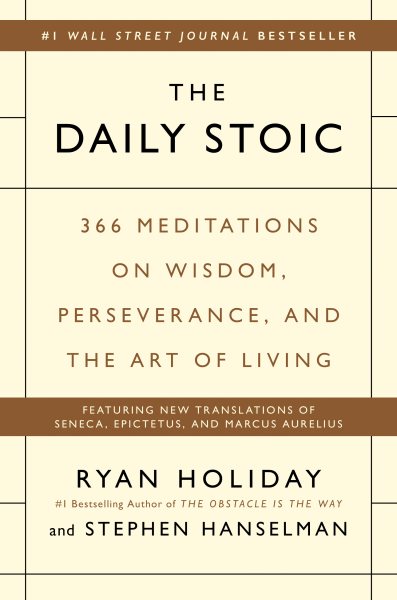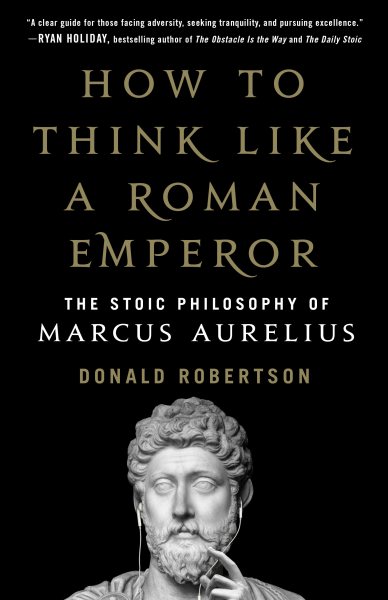Books on the Philosophy and Practice of Stoicism
The world can be a confusing and challenging place to navigate. Learning about the philosophy of stoicism may help you on the journey. Here are some books on learning the art of stoicism and focusing on what you control to help you through the mortal coil.

The Daily Stoic: 366 Meditations on Wisdom, Perseverance, and the Art of Living by Ryan Holiday and Stephen Hanselman
Presents a daily devotional of Stoic wisdom, anecdotes, commentary, and exercises which, when followed over the course of a year, will help readers find serenity and self-knowledge.

Lives of the Stoics: The Art of Living from Zeno to Marcus Aurelius by Holiday Ryan and Stephen Hanselman
Nearly 2,300 years after a ruined merchant named Zeno first established a school on the Stoa Poikile of Athens, Stoicism has found a new audience among those who seek greatness, from athletes to politicians and everyone in between. It's no wonder; the philosophy and its embrace of self-mastery, virtue, and indifference to that which we cannot control is as urgent today as it was in the chaos of the Roman Empire. In Lives of the Stoics, Holiday and Hanselman present the fascinating lives of the men and women who strove to live by the timeless Stoic virtues of courage, justice, temperance, and wisdom.

How to Think Like a Roman Emperor: The Stoic Philosophy of Marcus Aurelius by Donald Robertson
Roman emperor Marcus Aurelius was the final famous Stoic philosopher of the ancient world. The Meditations, his personal journal, survives to this day as one of the most loved self-help and spiritual classics of all time. In How to Think Like a Roman Emperor, cognitive psychotherapist Donald Robertson weaves the life and philosophy of Marcus Aurelius together seamlessly to provide a compelling modern-day guide to the Stoic wisdom followed by countless individuals throughout the centuries as a path to achieving greater fulfillment and emotional resilience.

The Stoic Challenge: A Philosopher's Guide to Becoming Tougher, Calmer, and More Resilient by William Braxton Irvine
The philosophy professor and author of A Guide to the Good Life draws on ancient-world wisdom to introduce the art of stoicism and how its techniques can augment contemporary therapeutic approaches to everyday and major setbacks.

That One Should Disdain Hardships: The Teachings of a Roman Stoic by Musonius Rufus
The Stoic philosopher Musonius Rufus was one of the most influential teachers of his era, imperial Rome, and his message still resonates with startling clarity today. Alongside Stoics like Seneca, Epictetus, and Marcus Aurelius, he emphasized ethics in action, displayed in all aspects of life. Merely learning philosophical doctrine and listening to lectures, they believed, will not do one any good unless one manages to interiorize the teachings and apply them to daily life. At a time of renewed interest in Stoicism, this collection of Musonius Rufus's lectures and sayings offers readers access to the thought of one of history's most influential and remarkable Stoic thinkers.

How to Be a Stoic: Using Ancient Philosophy to Live a Modern Life by Massimo Pigliucci
Whenever we worry about what to eat, how to love, or simply how to be happy, we are worrying about how to lead a good life. No goal is more elusive. In How to Be a Stoic, philosopher Massimo Pigliucci offers Stoicism, the ancient philosophy that inspired the great emperor Marcus Aurelius, as the best way to attain it. Stoicism is a pragmatic philosophy that focuses our attention on what is possible and gives us perspective on what is unimportant. By understanding Stoicism, we can learn to answer crucial questions: Should we get married or divorced? How should we handle our money in a world nearly destroyed by a financial crisis? How can we survive great personal tragedy? Whoever we are, Stoicism has something for us—and How to Be a Stoic is the essential guide.

How To Be Free: An Ancient Guide to the Stoic Life: Encheiridion and Selections from Discourses by Epictetus
Born a slave, the Roman Stoic philosopher Epictetus (c. 55–135 AD) taught that mental freedom is supreme since it can liberate one anywhere, even in a prison. In How to Be Free, A. A. Long—one of the world’s leading authorities on Stoicism and a pioneer in its remarkable contemporary revival—provides a superb new edition of Epictetus’s celebrated guide to the Stoic philosophy of life (the Encheiridion) along with a selection of related reflections in his Discourses. The work is an unmatched introduction to this powerful method of managing emotions and handling life’s situations, from the most ordinary to the most demanding.
Have trouble reading standard print? Many of these titles are available in formats for patrons with print disabilities.
Staff picks are chosen by NYPL staff members and are not intended to be comprehensive lists. We'd love to hear your ideas too, so leave a comment and tell us what you’d recommend. And check out our Staff Picks browse tool for more recommendations!
Summaries provided via NYPL’s catalog, which draws from multiple sources. Click through to each book’s title for more.
Read E-Books with SimplyE
 With your library card, it's easier than ever to choose from more than 300,000 e-books on SimplyE, The New York Public Library's free e-reader app. Gain access to digital resources for all ages, including e-books, audiobooks, databases, and more.
With your library card, it's easier than ever to choose from more than 300,000 e-books on SimplyE, The New York Public Library's free e-reader app. Gain access to digital resources for all ages, including e-books, audiobooks, databases, and more.
If you don’t have an NYPL library card, New York State residents can apply for a digital card online or through SimplyE (available on the App Store or Google Play).
Need more help? Read our guide to using SimplyE.